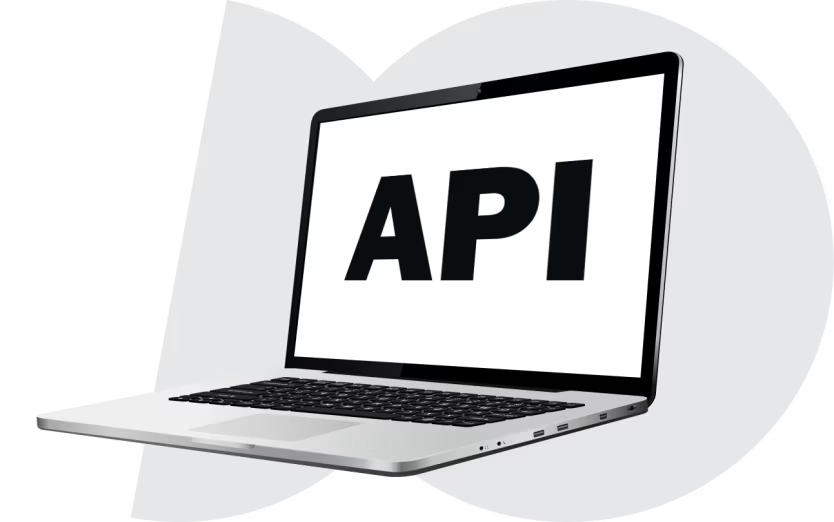API Development Company Scale your API development with nearshore talent.
Our API development services already power dozens of active engagements. We typically land our teams within 2 weeks, so you can start shipping top-quality software, fast.

500+ companies rely on our top 1% tech talent.





API Development Services We Provide
Custom API Development
Are you integrating third-party services, streamlining business processes, or creating a foundation for your product ecosystem? Our custom API development services help you improve data transfer between systems and create stellar user experiences across platforms. Using tools like REST, GraphQL, and SOAP and frameworks like Node.js and Express, we build fast, high-performing APIs that scale. Looking for cloud-native APIs? Our devs also work with AWS API Gateway and Azure API Management.
Mobile API Development
Keep your mobile app fast and responsive, even during high traffic. Whether it’s for Android, iOS, or cross-platform environments, we develop APIs that let your mobile apps interact smoothly with backend systems, external services, and other apps. We use REST and GraphQL for flexible and efficient data transfer. Node.js and Flask let us create fast mobile APIs that use minimal memory and processing power. We also implement OAuth 2.0 and JWT to secure interactions and protect user data.
Web API Development
Is fragmented communication between your systems slowing down your business processes? With our web API development services, you can connect your web apps to real-time data, third-party tools, and more for fast, secure interactions without bottlenecks. We create web APIs to integrate everything from e-commerce platforms to SaaS products and CRMs. Our team uses Node.js, Flask, and ASP.NET for the backend, and we rely on OAuth 2.0 and JWT to keep data safe.
Cloud API Development
Put an end to performance bottlenecks. Cloud APIs scale with your business. Let our devs integrate your apps, databases, and third-party services with cloud services for smooth, automated workflows. We use technologies like AWS API Gateway, Azure API Management, and Google Cloud Functions to build APIs that can handle high traffic loads and complex data processing. We also design them to protect your data as it moves between services.
Artificial Intelligence (AI) API Development
Push the boundaries of your apps. With AI APIs, our devs integrate intelligent algorithms that analyze data and learn from patterns. The result: innovative apps that perform advanced functions like providing real-time recommendations and accurately forecasting trends. We use TensorFlow, PyTorch, and OpenAI’s GPT to create powerful AI models and TensorFlow Serving to deploy them efficiently. We also rely on ONNX to make sure our models work smoothly across different platforms and systems.
Custom API Integration Services
Struggling with platform incompatibility? We set up custom API integrations that overcome capabilities issues and help you minimize data bottlenecks, manual data entry, and human error. To connect everything from CRMs to payment gateways, we use tools like REST and GraphQL. We also work with Zapier and MuleSoft to automate your data flow and AWS Lambda for event-driven integrations and automation.
API Gateway Development
Prevent system overloads before they cause slowdowns and costly crashes. Our custom API gateways balance traffic and boost performance to keep your infrastructure stable, even when managing dozens of microservices or integrating high-volume payment systems. Using tools like AWS API Gateway and Azure API Management, we develop API gateways that handle high traffic volumes, route requests efficiently, and protect your APIs from unauthorized access and throttling issues.
API Testing
Do your APIs hold up under pressure? Our experts thoroughly test every aspect of your API, from functionality to performance and security. So you can identify and resolve problems before they impact users. For automated API testing, we use tools like Postman, SoapUI, and JMeter. Our process includes functional testing to see if APIs work as expected, load testing to gauge their performance under heavy traffic, and security testing to guard against vulnerabilities.
ENGAGEMENT MODELS
HOW WE HELP
Why Choose Devdisruptors for API Development

Work with skilled senior developers with extensive API experience. Our vetting process includes thorough technical, critical thinking, English language, and soft skills evaluations. Out of 2.2 million applicants per year, we hire less than 1%. If you want top API talent, partner with us.
Do you need complex integrations between multiple platforms? Are you looking for custom endpoints to handle specific workflows? Our expertise spans 100+ industry sectors. Meaning, our devs have the experience to deliver custom API solutions that fit your infrastructure and requirements.
We take data and system security seriously. To protect sensitive information and guard against vulnerabilities, we implement authentication protocols, data encryption, rate limiting, and throttling. We also conduct risk assessments, rigorous testing, and quality assurance to give you high-quality APIs that can withstand security threats and maintain performance under heavy loads.
Our experts have been working alongside in-house teams for over a decade.
- React
- Angular
- Node.js
- Java
- C++
- .NET
- Vue.js
- JavaScript
- Python
- Golang
- React
- Angular
- Node.js
- Java
- C++
- .NET
- Vue.js
- JavaScript
- Python
- Golang
- Swift
- Figma
- Adobe
- C#
- PHP
- iOS
- Android
- Python
- WordPress
- Swift
- Figma
- Adobe
- C#
- PHP
- iOS
- Android
- Python
- WordPress
Key Things to Know About APIs
APIs are at the heart of how today’s software works. They connect systems, fuel innovation, and improve user experiences. Here’s how:
- Integration and Interoperability. APIs help different software systems work together by letting them share data and functions seamlessly. They act as connectors that allow systems to "talk" to each other so that everything runs smoothly and so that one system can use features from another.
- Innovation and New Services. APIs let developers get creative and add new features to apps on a larger scale. By using APIs, they can expand what applications can do to bring fresh functionality and enhance overall capabilities. Put simply, APIs let us create more innovative and exciting software.
- Better User Experience. APIs make software more interactive and useful. With features like secure logins, payment processing, and geolocation, developers can create more intuitive and reliable apps that give users a smoother, more engaging experience.
APIs are the hidden heroes behind modern software. They help developers by:
- Connecting different systems and software so they can share data and work together seamlessly
- Automating tasks between applications, reducing manual work
- Adding new features or services to existing applications without rebuilding from scratch
- Providing controlled access to data for third-party developers or services
- Enabling secure authentication and authorization for apps
- Supporting system growth by facilitating communication between multiple services or platforms
APIs come in various types, each offering unique benefits that can improve workflows, connect systems, and open up new, innovative opportunities. Here’s what you need to know:
Open APIs (Public APIs): These are available to external developers and users, often to encourage innovation and share data, like the Google Maps API.
Internal APIs (Private APIs): These are used within an organization to streamline internal processes and allow different teams or systems to communicate efficiently.
Partner APIs: These APIs are shared exclusively with external partners and offer controlled access to data or systems for collaborative purposes.
Composite APIs: These APIs combine multiple requests into a single call, simplifying complex systems or multi-step operations.
RESTful APIs (or REST APIs): The most widely used type, RESTful APIs rely on HTTP methods to access and manage resources over the web.
GraphQL APIs: These allow clients to request specific data fields, which improves performance by avoiding the over-fetching or under-fetching of data.
SOAP APIs: Known for being more rigid, SOAP APIs are typically used in enterprise environments where security and transaction reliability are paramount.
WebSocket APIs: These provide full-duplex communication, which makes them ideal for real-time applications like live chat or video streaming.
How to start with Us
Our process. Simple, seamless, streamlined.

Step 1
Join exploration call.
Tell us more about your business on a discovery call. We’ll discuss team structure and approach, success criteria, timescale, budget, and required skill sets to see how we can help.
Step 2
Discuss solution and team structure.
In a matter of days, we will finalize your project specifications, agree on an engagement model, select and onboard your team.
Step 3
Get started and track performance.
Once we’ve agreed on milestones, we’ll immediately get to work. We’ll track progress, report updates, and continuously adapt to your needs.
Frequently Asked Questions (FAQ)
The time varies depending on your project’s scope and complexity. For simple, straightforward APIs, you can expect a timeline of about 2-3 weeks. More complex APIs—especially those that connect multiple systems, need advanced security, or handle real-time data—could take anywhere from 6 weeks to several months.
You need to monitor them regularly to track performance, spot slowdowns, and detect security vulnerabilities. As systems evolve, APIs may need updates to handle new integrations or features so that they stay compatible with changing software or platforms.
You’ll also want to patch security vulnerabilities over time and manage versioning so that older versions of your API don’t disrupt current users. You should also test to make sure updates don’t break functionality or cause downtime for connected systems.
APIs handle high-traffic loads using several strategies. Load balancing spreads requests across multiple servers to keep things running smoothly. Rate limiting controls the number of requests per user or system to prevent overload. Caching reduces server strain by storing popular data closer to the user. When traffic spikes, autoscaling kicks in, adding more server power to handle the load. Once traffic slows, it scales back down to maintain efficiency. This keeps the API fast and reliable, even during peak times.
We design them with flexibility in mind. Our devs use modular architecture and versioning, so updates don’t disrupt existing functionality. We stick to widely accepted standards like REST and GraphQL, which makes it easier to integrate with new technologies as they evolve.
Backward compatibility is important. This means making sure older systems still work with updated APIs. Plus, regular testing and monitoring help us spot areas for improvement so that the API adapts as your business and technology stack evolve.
API development involves building a new API from scratch and creating the structure that lets systems talk to each other. API integration, on the other hand, involves connecting existing APIs to different systems.
APIs are designed to be language-agnostic. They can work with any programming language if it supports the necessary protocols (like HTTP for RESTful APIs). It doesn’t matter if you’re working with JavaScript, Python, Java, or another language. APIs create a standardized way for systems to communicate. This makes it easy to integrate different technologies, no matter what your tech stack looks like.
Want to accelerate API development at your company?
See how we can help.

